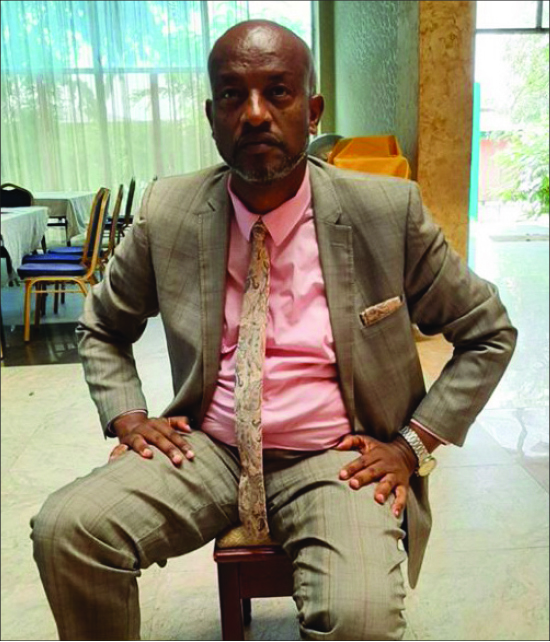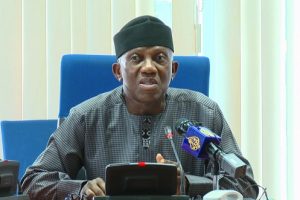
Abat Kisho served as President of the Southern Nations, Nationalities and Peoples of Ethiopia back in the day.
Born and raised in the former Sidama Province, Dale district, Tula Kebele in 1964, he pursued his primary education at Princess Aida School which was named after Emperor Haile Selassie’s granddaughter, and secondary education at Yirgalem General Comprehensive Secondary School. Subsequently, he joined Adama Teacher’s Training Center and then he set in motion making a living as a teacher. In the same way, he obtained bachelor’s and master’s degrees in Business Administration from Netherlands and England respectively.
Having served as a teacher for seven solid years, Abate was appointed as President of the Southern Nations, Nationalities, and Peoples of Ethiopia. However, as time went by, on the pretext of corruption and other unforeseen reasons, he was sentenced to six years in prison. Hence, he had passed through many twists and turns in life.
At the moment, aside from partaking in peace and reconciliation affairs, Abate runs his own business.
Some months back, The Ethiopian Press Agency journalist had a short stay with Abate Kisho. He has touched upon several interesting issues concerning his personal and professional life. Below are excerpts:
What was the relationship you had with the federal government like?
I dare say, the Federal System was in its infancy in 1991. The country was led from 1990-1994 in the Transitional Period Charter of Ethiopia which was endorsed in 1991.
At that specific point, the number of regions across the country was fourteen. There were regions like seven, eight, nine, ten and eleven which at the end of the day turned out to be the Southern Nations, Nationalities, and Peoples of Ethiopia.
Unfortunately, the main actor of each and everything was dominated by a single party. Half members of the House of Peoples Representatives were members of the ruling parties while the rest eighty-seven people were the so-called representatives of the people of Ethiopia. The founding members of EPRDF were Tigray People Liberation Front (TPLF) Amhara Nations Democratic movement (ANDM) and Oromo People
Democratic Organization (OPDO).
After we had formed the South Ethiopia Peoples Democratic Front, we ended up joining EPRDF in1992. We were in the habit of acting per the dictation of TPLF’s instructions. More to the point, on the pretext of experience sharing, representatives of the ruling party were assigned in the region for the love of putting their hidden agenda into effect.
As a president did you use to have the freedom to exercise your power?
I was not free to exercise my power. The region was led with full of interferences. The federal government was meddling in what does not concern it now and then. As to me, the federal government does not have to interfere in regional affairs. If things keep on going in this way, people may understand the government agenda in the wrong way. The cold shoulder should be given to this kind of immoral act. It has to be improved in the not far distance.
When we talk of the ruling party, the creation of the different parties under its umbrella was different as day and night. Soon after, parties were formed earlier and joined the EPRDF. It is undeniable fact that TPLF had caused the downfall of the Derg regime. The secret behind their success was collaboration. For no apparent reason, they embarked on putting pressure on us than showering with their experience. The parties which were formed later failed to stand together. They were assigned on the pretext of supporting Oromia and the southern region. At that point, everybody was under the cloud of uncertainty.
Concerning Bitew Belay a wide spectrum of people was posing questions. OPDO and ANDM were the major supporters of the experience sharing campaign. Leaders of the region were branding their act as interference. The assignment of people on OPDO and SPDF was posing a question mark on the freedom of the region and federalism.
Have you ever raised the question of the people of Sidama at the time you were in power? If so, why did not you get a solution yet?
For quite a lot of years, the people of Sidama were raising the question of self-determination. This is not a recent issue. For their freedom, the people of Sidama had fought for quite a lot of years. Earlier than that there was the Sidama People Movement.
At that time, as the parliamentary structure of the different Nations, Nationalities, and Peoples of Ethiopia was not designated by specific names but figures, the case was not taken to the parliament. The whole thing was organized in a way that fits the ruling party. Through time, the ruling party merged the different regions of the country and dubbed them the Southern Nations, Nationalities, and Peoples of Ethiopia. TPLF had tailored the different regions of Ethiopia to fit its party.
After the formation of the region in 1994, the people of Sidama had raised the same question the article to be revised in a way that favors the various Nations, Nationalities, and Peoples of Ethiopia.
Following the request, some points were made to be incorporated in the constitution of article 47 saying if the different Nations, Nationalities, and Peoples of Ethiopia raise questions related to self-determination in their council, their questions will get a solution within a year. But when the people rose the question accordingly the article they ended up saying the system cannot divide the regions more than the existing ones.
Once [Late Prime Minister] Meles Zenawi said related to the question, “The question is right. The constitution bestows you the right. Give us time. We will let you know our decision in a short period.” Though it was a frequent question, concerned bodies delayed the case. At the moment, the case of the People of Sidama has already reached for a referendum.
Why were you thrown into prison?
At the outset, there were problems among the EPRDF members at that specific juncture. The major problem of the argument was whether to fight in a war with Eritrea or not. This reality on the ground had caused major friction amongst the TPLF members. Whatever happened, they were not able to reach into a consensus. They were split into two categories. The situation kept on getting into uncharted waters. In due course, they asked the different parties to stand by their sides.
All of a sudden, ANDM grew to be the first supporter of Meles Zenawi’. The party even embarked on running a campaign that Oromia and South to stand by the side of Meles Zenawi.
As time went by, some of us were considered as the opponent of Meles Zenawi. Sadly, at the time when a general meeting was held, the premier banned thirteen members. At that juncture, my colleagues and I had suggested pertinent bodies to get to the bottom the problem through dialogue but nobody was in the position to lend us their ears. If other parties had the power, they would have solved the problem in a little while.
Almost immediately, ANDAM, OPDO, and SNNPS stood by the side of Meles Zenawi. As I was the president of the Southern, Nations, Nationalities and Peoples of Ethiopia, I was thrown into prison on a pretext of a twenty-seven million Birr corruption. To the surprise of everyone, at the time when Tamirat Layne was the premier of Ethiopia, he had bought vehicles for four states at a cost of 27 million Birr.
At the time when a language called WGAGODA was formed from Wolaita, Gamo and Dawiro languages. What was the rationale?
It is the community that raised the question of language, identity, structure, and other related aspects. Besides, leaders exchanged views on the peoples’ interest and decisions. The whole lot was done fairly and freely. Whenever a certain question arose from the regional or federal government, leaders, elderly people, and religious fathers hold discussions on the matter.
The thing was, one fine day, leaders of the three language speakers reported that the community would like to form the same language out of the just mentioned languages. Then, authorized bodies brought the case to the region as if the community had discussed the matter and made a decision. Last but not least, as the community was not able to reach into a common consensus on the issue, the unexpected happened.
Sometimes, issues which seem to win the hearts and minds of the people may travel a long distance. But if people are not happy with a certain issue, we have to stand by their side and make their dream become a reality.
When all is said and done, we understood the fact that the issue did not reflect the interest of the community. Hence, we removed the main actors from their positions.
What is your take on the reform?
I have the guts to say the reform is too late. Had the reform taken earlier, I would have been very happy. The reform should have taken place during the split which took place in 2001. At that juncture, EPRDF was not in good shape and form. In fact, it is not possible to say there is no development at all in the country. The government had attached some significance to road infrastructures and higher learning institutions. But the ruling party had weakened competitive parties.
Once I said about EPRDF, “It is like an Eucalyptus Tree. It was seen flourishing every so often. But it did not want any plants in its surroundings. EPRDF and this tree are two sides of the same coin. It said had renewed itself at different times, but it has not changed itself for the better. There had been no change.”
Hence, the reform is very significant. The ruling party had renewed itself several times but in vain. We should accept and support the reform and keep on going by bridging gaps. Parties should play a major role in ways that take the ongoing reform to real federalism and democratic system.
The Ethiopian Herald May 22/2020
BY ADDISALEM MULAT



